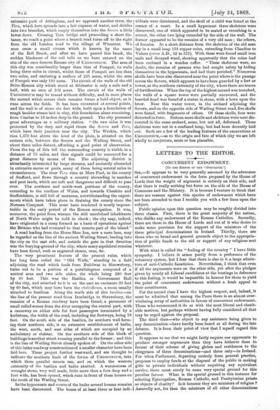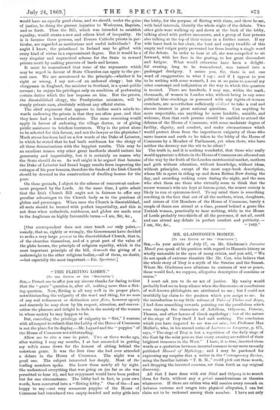LETTERS TO THE EDITOR.
CONCURRENT ENDOWMENT.
[TO THE EDITOR OF THB " SPEOTATOR.1
Snt,—It appears to be very generally assumed by the advocates of concurrent endowment in the form proposed by the House of Lords that the weight of argument is entirely on their side, and that there is really nothing but force on the side of the House of Commons and the Ministry. It is because I venture to think that there are reasons against this species of endowment which have not been attended to that I trouble you with a few lines upon the' subject.
Public opinion upon this question may be roughly divided into, three classes. First, there is the great majority of the nation,
who dislike any endowment of the Roman Catholics. Secondly; there are those in the House of Lords and out of it who desire to- make some provision for the support of the ministers of the
three principal denominations in Ireland. Thirdly, there are' those who on broad and general grounds object to the appropria- tion of public funds to the aid or support of any religious sect whatever.
With what is called the "feeling of the country" I have little sympathy. I believe it arises partly from a preference of the. voluntary system, but I fear that there is also in it a large admix- ture of anti-Catholic fanaticism. Nevertheless, I think that even if all the arguments were on the other side, yet after the pledges
given by nearly all Liberal candidates at the hustings in deference- to this feeling, it would be impossible in honour for them to yield, the point of concurrent endowment without a fresh appeal to their constitnents.
For the second class I have the highest respect, and, indeed, it must be admitted that among the Peers there is an almost over- whelming array of authorities in favour of concurrent endowment. Those who recommend it do so with the most liberal and charit- able motives, but perhaps without having fully considered all that may be urged against the proposal.
The third class—who object to any assistance being given to any denomination—have hardly been heard at all during the late debates. It is from their point of view that I myself regard this. question. It appears to me that we might fairly require our opponents to produce stronger arguments than they have hitherto done in, favour of their scheme of giving glebes and residences to the clergymen of three denominations—and three only—in Ireland- For when Parliament, departing entirely from general practice, proposes to employ funds at the disposal of the public in making gifts to private individuals without requiring any equivalent service, there must surely be some very special ground for this peculiar favour. What is the special ground in this instance for selecting Episcopalian, Roman Catholic, and Presbyterian priests. as objects of charity? Is it because they are ministers of religion ? Assuredly not, for then the ministers of all other denominations. would have an equally good claim, and we should, under the guise of justice, be doing the gravest injustice to Wesleyans, Baptists, and so forth. Thus the Bill, which was intended to establish equality, would create a new and odious kind of inequality. Or is it because these persons, and Roman Catholic priests in par- ticular, are regarded as meritorious and useful individuals ? For aught I know, the priesthood in Ireland may be gifted with every kind of virtue in a supereminent degree. But it would be a very singular and unpractical scheme for the State to reward private merit by making presents of lands and houses. It must be remembered that none of the arguments which may be urged in favour of State Churches can apply to the pre- sent case. We are accustomed to the principle—whether it be right or wrong, I say not—of an endowed clergy ; but the clergyman in England, the minister in Scotland, is a quasi-public servant ; he enjoys his privileges only on condition of performing certain duties which the law imposes on him. But the priests, the disestablished clergy, the Presbyterian ministers, will be simply private men, absolutely without any official status.
The chief argument that appears to incline men's minds to- wards endowing the priests is that they are often poor, and that they have had a learned education. The same reasoning would apply in favour of endowing the village doctor, or of giving public assistance to briefless barristers. Why is the priest alone to be selected for this favour, and not the lawyer or the physician? Much stress has been laid on a few words of the Duke of Leinster, in which he stated that he had built residences for the clergy of all three denominations with the happiest results. This may be an excellent reason why other great landlords should imitate his generosity and impartiality, but it is certainly no reason why the State should do so. As well might it be argued that because the Duke of Leiuster had found happy results from improving the cottages of his poor tenants, therefore the funds of the Irish Church should be devoted to the construction of dwelling-houses for the poor.
On these grounds, I object to the scheme of concurrent endow- ment proposed by the Lords. At the same time, I quite admit that the Irish Church Bill ought not in fairness to offer any peculiar advantages to the Church body as to the purchase of glebes and parsonages. When once the Church is disestablished, all sects should be treated with perfect impartiality, and this is not done when cathedrals, residences, and glebes are made over to the Anglicans on highly favourable terms.-1 am, Sir, &c., A.
[Our correspondent does not once touch our only point,— namely, that as, rightly or wrongly, the Government have decided to make a very large present to the disestablished Church, that is, of the churches themselves, and of a great part of the value of the glebe houses, the principle of religious equality, which is the most important principle of the bill, demands the giving of a makeweight to the other religious bodies,—all of them, no doubt, —but especially the most important.—En. Spectator.]































 Previous page
Previous page